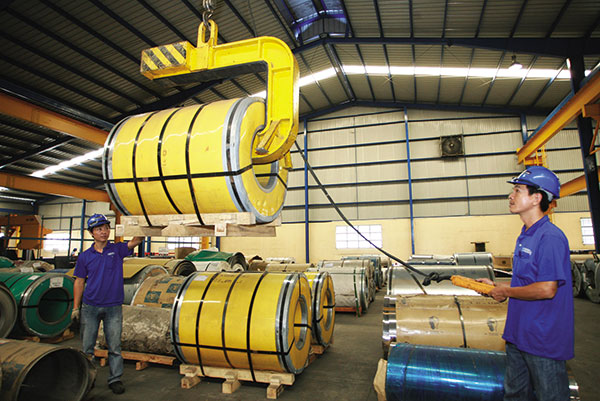Steel braves anti-dumping tax
 |
| As heavy anti-dumping duties on steel with Chinese inputs enter in force in the US, local steel diversifies its sourcing, Photo: Le Toan |
Giant steelmaker Hoa Sen Steel Group, one of the five largest domestic steel exporters to the US, reported that they draw on diversified import sources including India, Japan, and Formosa Ha Tinh Steel.
In December, the US Department of Commerce (DoC) said that it would apply the same Chinese anti-dumping and anti-subsidy rates on corrosion-resistant and cold-rolled steel from Vietnam that starts out as Chinese-made cold-rolled steel. As such, Vietnamese cold-rolled steel with Chinese inputs would be subject to 265.79 per cent anti-dumping (AD) and 256.44 per cent countervail (CV) duties when exported to the US, respectively, while AD and CV duties of 199.46 and 39.05 per cent would be applied to Vietnamese corrosion-resistant steel with Chinese inputs. DoC is currently scheduled to announce its final ruling on the duties on February 16, 2018.
“In May this year, the first blast furnace of Formosa Ha Tinh Steel came into operation with an annual capacity of 3.5 million tonnes. The second is expected to become operational in March 2018, increasing the total capacity of the plant to seven million tonnes. This will allow its plant to produce 5.2 million tonnes of flat steel, primarily hot-rolled coil and hot-rolled band,” said a representative for a foreign steelmaker, who declined to be named.
According to Vietnam Customs, the country has to import five million tonnes of hot-rolled steel per year from other countries to make cold-rolled steel, steel sheets, and other products. China only accounts for 100,000 tonnes of this import.
As one of the largest exporters of steel products to the US, Pham Manh Hung, general director of Nam Kim Steel JSC (NKS), said that since the preliminary decision of November 6, 2016 by DoC related to anti-tax evasion, the firm had changed its rolled coil import sources to India, Vietnam, South Korea, and Japan. With NKS’ supplies of rolled coils provided by Formosa Ha Tinh Steel, the DoC decision - when applied officially - will not affect the former. Besides, Nam Kim Steel’s core steel sheet products are not on the list for increased taxes. “We can even increase our exports to the US in 2018,” Hung told VIR.
Nguyen Thanh Trung, general director of steelmaker Ton Dong A, said that his firm has full documentation to prove that they mostly import Japanese inputs. This would help them avoid these taxes, as DoC specifies on its website that importers and exporters of Vietnamese merchandise that is produced from substrate originating in Vietnam or a third country have the option of seeking an exemption from cash deposits by certifying that the substrate originated outside of China.
The Vietnam Steel Association (VSA) is also co-coordinating with the Ministry of Industry and Trade to protect the legitimate rights and interests of local steelmakers. According to VSA, the process of making corrosion-resistant or cold-rolled steel by Vietnamese businesses is a crucial step in the closed-loop manufacturing of high-quality flat steel bars, with factories in Vietnam receiving investment to the tune of hundreds of millions of US dollars as well as potentially adding 30-40 per cent added value to their products.
By Phuong Thu
What the stars mean:
★ Poor ★ ★ Promising ★★★ Good ★★★★ Very good ★★★★★ Exceptional
Latest News
More News
- Two national hospitals expand capacity with new facilities (December 20, 2025 | 09:00)
- Ha Tinh breaks ground on major Vingroup industrial and energy projects (December 19, 2025 | 18:24)
- EVN launches major power infrastructure projects nationwide (December 19, 2025 | 18:17)
- VAL inaugurates second production line to meet domestic animal feed demand (December 19, 2025 | 16:37)
- Sun Group pioneers urban tram system in Phu Quoc (December 19, 2025 | 15:00)
- Seven major projects launched to drive Hanoi’s next growth phase (December 19, 2025 | 14:00)
- Securing capital and efficiency for Vietnam’s 2026-2030 growth ambitions (December 17, 2025 | 10:00)
- Vietnam bucking trend in the global M&A landscape (December 16, 2025 | 14:20)
- HDS Summit spotlights Vietnam’s rising role in regional supply chains (December 16, 2025 | 08:00)
- Kolon signs $48 million airbag supply deal with Autoliv (December 15, 2025 | 18:14)


















 Mobile Version
Mobile Version